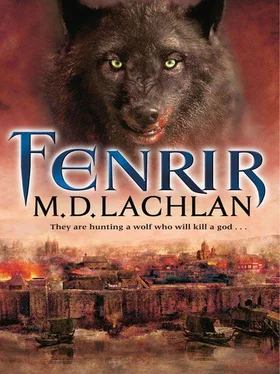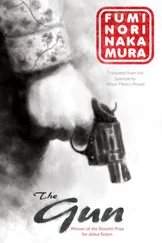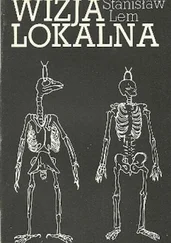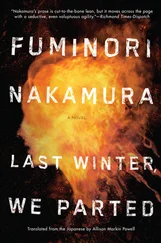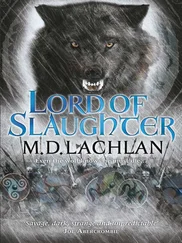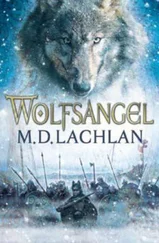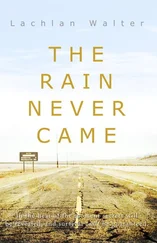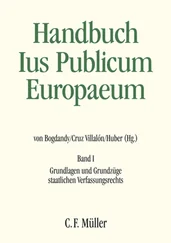M. Lachlan - Fenrir
Здесь есть возможность читать онлайн «M. Lachlan - Fenrir» весь текст электронной книги совершенно бесплатно (целиком полную версию без сокращений). В некоторых случаях можно слушать аудио, скачать через торрент в формате fb2 и присутствует краткое содержание. Жанр: Фэнтези, на английском языке. Описание произведения, (предисловие) а так же отзывы посетителей доступны на портале библиотеки ЛибКат.
- Название:Fenrir
- Автор:
- Жанр:
- Год:неизвестен
- ISBN:нет данных
- Рейтинг книги:5 / 5. Голосов: 1
-
Избранное:Добавить в избранное
- Отзывы:
-
Ваша оценка:
- 100
- 1
- 2
- 3
- 4
- 5
Fenrir: краткое содержание, описание и аннотация
Предлагаем к чтению аннотацию, описание, краткое содержание или предисловие (зависит от того, что написал сам автор книги «Fenrir»). Если вы не нашли необходимую информацию о книге — напишите в комментариях, мы постараемся отыскать её.
Fenrir — читать онлайн бесплатно полную книгу (весь текст) целиком
Ниже представлен текст книги, разбитый по страницам. Система сохранения места последней прочитанной страницы, позволяет с удобством читать онлайн бесплатно книгу «Fenrir», без необходимости каждый раз заново искать на чём Вы остановились. Поставьте закладку, и сможете в любой момент перейти на страницу, на которой закончили чтение.
Интервал:
Закладка:
What were you? said the voice.
A woman in a garden.
And I am not what I was.
What were you?
A child beneath a bench.
What have we become?
Little broken things.
Parts of a whole, said Aelis.
The runes spun and danced, and Aelis felt herself returning — Aelis, the frightened girl who had run from Paris, she of the line of Robert the Strong who only wanted to go back to that garden at Loches and see the moths dancing in the torchlight. But the moths weren’t dancing, she remembered; they were burning and dying.
She was underwater, Aelis realised, not breathing. The connection with her runes was weak. They were grouping together, eight, eight and eight, a triple knot forming in her mind, a knot older than the gods. Aelis felt behind her and put her fingers to the shaft of the spear that impaled her. She felt as if she had eaten too much, stuffed herself with an agonisingly enormous amount of food. She felt the runes’ departure like a tugging on her skin. She heard a noise like tearing gristle, smelled burning and knew that the thing with the childish voice intended her to die.
But there was one rune the child-thing that spoke to her had not seen, did not want. In her agony Aelis felt something step from the shadows of her mind and watched the rune slink forward, like a hunting wolf, low and lithe. Aelis heard a howl rupture the dead air of the cavern — like a wolf’s but wilder, more distressed. The rune snaked and pulsed in front of her, a dark slash in the fabric of reality. It was older than all the others, and it said so many things, but loudest of all it said, Wolf trap.
It spoke to Aelis, and she saw that it had been in her far longer than the other runes, stretching back many lives. And Aelis realised the voice was wrong: she did not have sixteen runes within her. She had seventeen. This rune did not dance in the orbits of eight, this rune did not chime or cheep or sing, but slunk and crept in the shadows of her mind. It was the rune that seemed like a rip in the daylight, the rune that howled.
‘Vali! Help me! Jehan, as you have become, help me!’
The rune’s darkness intensified inside her and a cold howl seemed to splinter her mind. All the fragments of what she had been rushed in on her. A girl by a hut by the water, a captive travelling north to be the instrument of sorcerers, a traveller rushing south in the snow, a girl in a garden by a river, a lady kneeling in the dark of a church, a fugitive, hunted and harried, a vessel, a cup to hold magical and perilous powers.
Breath! She was up from the water and in the air. Hands were around her waist, trying to push her out of the pool, but the spear that impaled her was too much of an encumbrance. The water was warmer, she noticed, and the warrior who had tried to drown her was gone.
‘Who?’
‘Hugin. Yours. I am he that protected you before, come for you. Feileg.’
The last word was a name, spoken uncertainly. It stirred memories in her, as the wind brings sound from the smoke vent of a house. She had been there before, in such a place underground, facing a terrible and murderous child. Words came back to her said in regret and misery, but words that she meant more than anything she had ever said in her life before.
‘I will live again without you, Vali. You are hated by the dead god.’
In the garden at Loches, where the moon metalled the trees and the river lay like a bridge of light between the darkness it came from and the darkness into which it disappeared, something had chased her. Now she could turn to face it. She saw him standing there. The confessor, Jehan, the man who, when she looked again, was a wolf. Ahead of her on the path through the trees stood another man, almost identical, his face untorn by scars or welts, a man who beckoned her with love in his eyes. It was Hugin, the Raven — Feileg as she had known him in the life before. The truth was clear to anyone. The two men were brothers.
In the underground chamber there was a crash and the ceiling shook, sending stalactites crashing into the water.
‘He is coming.’ The childish voice again. ‘Kill her.’ Sua’va spoke to Hugin. But the runes were still locked in their embrace, not listening to what she said.
There was another enormous crash and part of the ceiling collapsed into the pool.
Sua’va shouted,
‘A ship sails from across the sea,
And Loki is steering.
There with the wolf
Comes the lord of lies.’
There was a shuddering blow stronger than that of a gale sea into a headland — Aelis felt it in her chest — and the ceiling collapsed. Grey daylight flooded in, and with it a terrible howl, a sound from the dungeons where the mind buries its fears.
The voice was nearly screaming now:
‘Stone cliffs tumble
And troll-witches stumble.
Men tread the road to hell
And the sky is sundered.’
The wolf’s head came drooling through the gap in the ceiling, snapping and biting at the air, dislodging a torrent of soil.
‘Will it harm us?’
‘It is here to kill us,’ said the voice, ‘but it needs a littler murder first.’
The wolf dropped into the pool with a huge splash and Aelis clung to Hugin as the water swept over her head. He had her and, despite the spear, pushed her up onto the lip of the pool. She thought she would black out with the agony. Her vision blurred and she vomited blood. When she regained her sight she looked up to see two figures beside her. One was Hugin. He’d dragged her from the water, away from those huge jaws, which opened to the height of a man. The other was the emaciated figure of a woman or a child, it was difficult to tell which. Her body was terribly thin and her face was the face of the drowned.
‘Stop!’ Aelis screamed at the wolf as it fixed the child with a stare, drawing its lips back from its dripping jaws.
It turned its great head. ‘Aelis,’ it said, ‘I am here for you. I am here to protect you.’
‘I am dying and you cannot.’ Another piece of the ceiling fell into the pool. The rest was crumbling and looked ready to cave in.
‘I am a healer. I can help you.’
‘Do you know yourself, Confessor? You are a killer and a slayer of many.’
‘I am lost, Aelis.’
The runes were humming around her like moths and butterflies, bees and sparrows. They were uniting, she could feel, and she knew for sure she was dying. ‘This is our destiny,’ she said. ‘It has always been and will always be. You are the killer and I draw you to the kill.’
‘We will oppose it,’ said Hugin. In future lives perhaps we will know ourselves and avoid this fate.’
‘Then we all must die,’ said the wolf, ‘so we all might live again.’ It leaned out of the water, its head over the shelf of rock.
‘This is the skein that is woven,’ said Svava, ‘again and again and again. The slaughter-fond god will come and he will have his death.’
‘Then let us die,’ said Hugin.
‘No!’ Aelis cried out but Hugin came forward and struck the wolf across the muzzle with his sword, sheering away a great flap of flesh and exposing the teeth beneath.
The great wolf howled and shook. Jehan could no longer control the animal he was.
Hugin raised his blade for a second blow but the wolf was too quick. It drove its jaws into his body, seized him about the waist, tearing a handspan of flesh from his side, and threw him behind it into the water, the sword still gripped in his hand, slashing wildly. Hugin tried to get up, but there was a rumble and a great slab of ceiling fell away, crashing down on top of him.
Ofaeti, standing deep inside the hole the wolf had torn in the barrow, watched Hugin sink. He swung himself down on a tree root onto the pile of rock and earth that had fallen from the ceiling and groped in the water. He gripped something. A hand, still holding that curved sword. Ofaeti pulled and the Raven came free, gasping and choking into the air.
Читать дальшеИнтервал:
Закладка:
Похожие книги на «Fenrir»
Представляем Вашему вниманию похожие книги на «Fenrir» списком для выбора. Мы отобрали схожую по названию и смыслу литературу в надежде предоставить читателям больше вариантов отыскать новые, интересные, ещё непрочитанные произведения.
Обсуждение, отзывы о книге «Fenrir» и просто собственные мнения читателей. Оставьте ваши комментарии, напишите, что Вы думаете о произведении, его смысле или главных героях. Укажите что конкретно понравилось, а что нет, и почему Вы так считаете.
